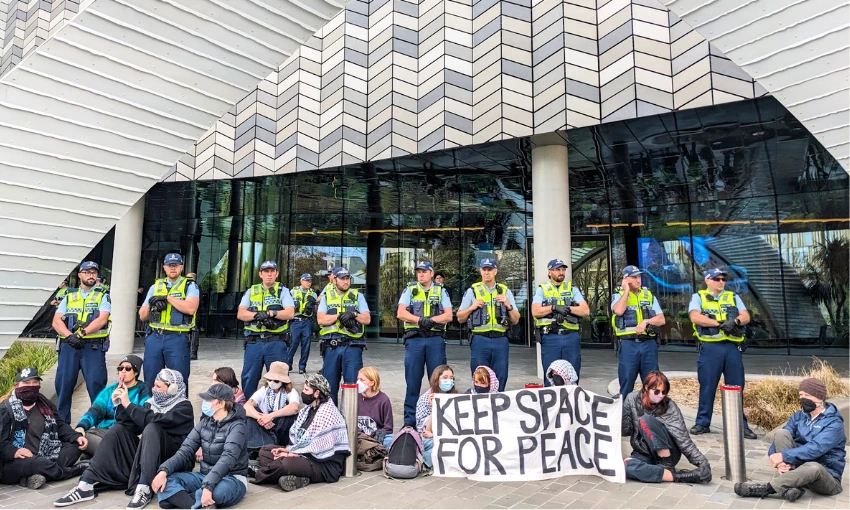By Shanti Mathias
Copyright thespinoff

Protesters attempting to block the entrance to the annual summit in Christchurch were arrested this morning, while others remained outside the venue all day, calling for delegates to not use space technology for military purposes.
More than 100 protesters held signs reading “Peter Beck makes NZ a target” and “Keep Space for Peace” outside Christchurch’s Te Pae Convention centre today, attempting to stop attendees from entering the New Zealand Aerospace Summit. Two dozen people chained themselves outside the doors, before many were forcibly carried away by police, while supporters further out chanted “Rocket Lab is supporting genocide”.
In a statement, Superintendent Lane Todd said the police had made 30 arrests for trespassing and obstruction, and continued to attend the all-day protest.
Joseph Bray, a spokesperson for Peace Action Ōtautahi, said the police had been using unnecessary force. “We unfortunately had people being dragged by their neck, someone was punched in the back of the head by a police officer and kicked as they were being moved on.”
The Aerospace Summit is an annual gathering of businesses from the space sector. Minister of space Judith Collins was in attendance, and in a press release, welcomed the “accelerating” space industry. “Our space and advanced aviation sectors are more than just rockets, drones and satellites. They’re about advanced manufacturing, AI and autonomy, earth monitoring and next-generation mobility,” she said. “The sectors are also about building a high-tech economy that delivers high-value jobs and solutions to global challenges.”
The blockade was held “in protest of the overt and extensive links between New Zealand’s aerospace sector, foreign militaries, and defence companies”, according to a press release sent by Peace Action Ōtautahi last month.“We’re not anti-technology,” said Bray at the protest today. “There are so many amazing things we can do with technology when monitoring wildfires or coastal erosion, but when that technology is also used to monitor civilian populations for missile strikes, that’s not advancing humanity.”
In a statement on its website, the summit organisers said they had met with Peace Action Ōtautahi before the event, where they had “made clear our expectation that protesters act respectfully and not take action that impacts the comfort of our attending professionals, educators and students”. The statement acknowledged the possibility of using aerospace technology for military purposes, saying members were expected to comply with New Zealand law regarding their operations. Aerospace New Zealand has signed “The Washington Compact on Norms of Behaviour for Commercial Space Operations”, which it said “fosters cooperation between governments and private entities to ensure the safe, peaceful, and interoperable use of space for the benefit of all”.
As the summit started, protesters sang waiata and chanted “Judith Collins, you can’t hide, you’re supporting genocide”. Protester Aurora Garner-Randolph’s voice broke as she read out a message from a photojournalist in Gaza, supporting the protest and condemning the use of technology for war. “Not one more death facilitated by aerospace technology launched from Aotearoa,” she said, to applause.
Speaking to RNZ at the summit, Collins said protesters who alleged the government was complicit in genocide “lived in another world”, adding that “the space industry in New Zealand is primarily civilian – not all, but primarily – and it is crucial for our communications; it’s crucial for our surveillance… our search and rescue work”.
Sonya Smith, a member of Rocket Lab Monitor who lives near Mahia Peninsula, where Rocket Lab’s launchpad is, called in, with Garner-Randolph asking her questions over the phone, the answer to which were broadcast to attendees. There were boxes of snacks to fuel people sitting on the concrete, and water and coffee available.
The alleged presence of a representative from the US Department of War emphasised the protesters’ concerns that the New Zealand government was too closely tied to the US military. Bray said he was frustrated by the narrative of “success” and “jobs” Collins had been promoting. “There is no success in profiting from war and funding militaries and weapons companies that commit these atrocities worldwide.”
Among the companies listed on the Aerospace New Zealand Summit webpage are private defence company Nova Systems, which has worked with the New Zealand and Australian defence forces, New Zealand company Dawn Aerospace, which has received an “innovation” contract from the United States Airforce, and NZ-founded, US-based company Rocket Lab. A private company, Rocket Lab has launched multiple payloads for the US military from New Zealand (payloads are the instruments or equipment a rocket takes to space, separate from the actual body and fuel of the vehicle).
While Rocket Lab CEO Peter Beck said in 2008 that “if it’s involved in the military, we don’t want anything to do with it”, the company has been receiving US military contracts since 2009, including a $460m deal with a missile company in 2024. It has also been referred to the International Criminal Court by the Palestine Solidarity Network Aotearoa, over concerns that its launches for a company called BlackSky have been used to provide satellite imagery to the Israeli military in its attacks on Gaza. “When our aerospace industry here domestically is producing technology for the United States military and launching for the Israeli defence force, that makes us complicit in the genocide of Gaza,” Bray said.
While the boundary between technology used for space and technology used for the military might be blurry, Bray said there was an opportunity to make it less so. Peace Action Ōtautahi would like all parties in New Zealand to commit to legislation banning dual-use space technology, meaning satellites or rockets could only be used to carry equipment with civilian uses in mind, rather than civilian uses which can also be commandeered for the military. “We need to stop hiding behind this thin veneer of space exploration,” he said.